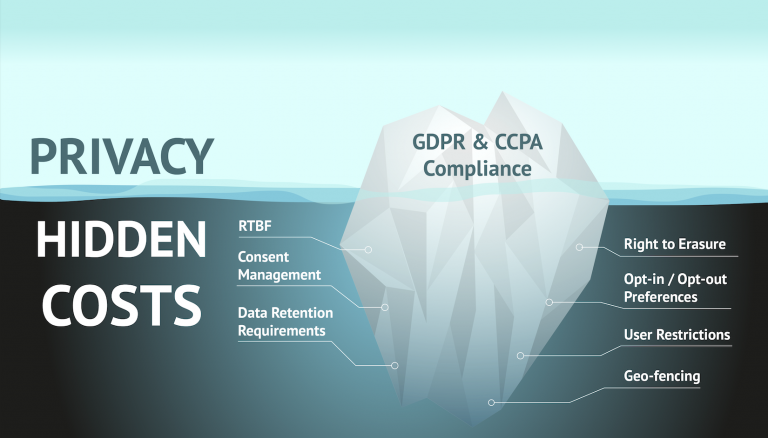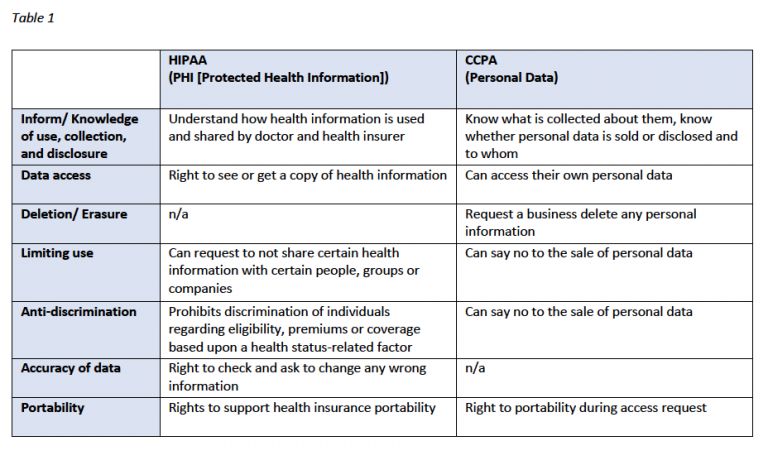
Health Insurance Portability and Accountability Act (HIPAA) and the California Consumer Privacy Act (CCPA) have been implemented to ensure that healthcare and technology companies handle patient data with the utmost care. For software companies that deal with healthcare information, HIPAA compliance is mandatory, while for those operating in California, CCPA compliance is required. Failure to comply with these regulations can lead to severe consequences, including hefty fines, legal action, and reputational damage.
This is where software consulting for HIPAA/CCPA-compliant healthcare applications comes in. This article will explore the importance of compliance with these regulations, the challenges software companies face in achieving compliance, and how software consulting services can help them meet these requirements.
We will also discuss the benefits of compliance beyond avoiding penalties, including improved data security, enhanced customer trust, and increased competitive advantage. These and many other benefits are real-world results our team at Itirra has helped clients achieve with software consulting for HIPAA/CCPA-compliant healthcare applications.
Why is HIPAA and CCPA compliance so important?
Compliance with the Health Insurance Portability and Accountability Act (HIPAA) and the Consumer Privacy Act (CCPA) is paramount for healthcare companies. Both regulations mandate strict guidelines for handling sensitive and personal information, including patient data.
HIPAA, for example, sets out comprehensive standards for the protection and confidentiality of electronic protected health information (ePHI). Covered entities and their business associates, including healthcare providers, health plans, and software vendors, must comply with HIPAA’s privacy, security, and breach notification rules. Failure to comply with HIPAA can result in significant financial penalties and reputational damage.
Similarly, the CCPA requires companies to disclose the categories of personal information they collect, sell, or disclose to third parties. CCPA also gives consumers the right to opt out of the sale of their personal data and the right to request that their information be deleted. Non-compliance with CCPA can lead to fines, class-action lawsuits, and damage to a company’s standing.
The importance of compliance with HIPAA/CCPA extends beyond avoiding legal penalties. Healthcare companies that meet these regulations’ standards can enhance their data security, build customer trust, and gain a competitive advantage in the marketplace. Compliance can also provide a significant return on investment by reducing the risk of data breaches and mitigating legal liabilities.
What are the main challenges with HIPAA and CCPA compliance?
Compliance with HIPAA and CCPA can be challenging due to their complexity, lack of resources, changing rules, third-party vendor compliance, human error, and data breaches. Health systems must address these challenges to fully comply with the regulations and avoid legal liabilities and reputational damage.

Complex regulations
Companies must be familiar with HIPAA and CCPA provisions to achieve compliance. For example, HIPAA’s privacy rule requires companies to implement safeguards to ensure the confidentiality, availability, and integrity of ePHI. CCPA requires companies to disclose the categories of personal information they collect, sell, or disclose to third parties. Companies must also ensure they comply with other requirements, such as HIPAA’s security rule and CCPA’s opt-out and opt-in provisions.
Lack of resources
Compliance with HIPAA and CCPA requires significant resources, including personnel, technology, and financial investments. Smaller companies may lack the resources to implement essential compliance measures, such as hiring dedicated compliance personnel or investing in cybersecurity infrastructure. This can make it challenging for smaller companies to achieve compliance with these regulations.
Changing rules
HIPAA and CCPA regulations are subject to change, and companies must keep up-to-date with any updates or modifications to remain compliant. For example, HIPAA has undergone several changes since its inception, including privacy, security, and breach notification rules updates. Similarly, CCPA has been amended several times since its initial enactment. Healthcare companies must be aware of any changes to these regulations to remain compliant.
Third-party vendors
Companies that work with third-party vendors must ensure they are also compliant with HIPAA and CCPA regulations. This can be challenging as many vendors may not have the necessary compliance measures. Companies must ensure that their vendors sign business associate agreements outlining their data privacy and security responsibilities.
Human error
Human error remains a significant risk factor even with the most robust compliance measures. Employees may accidentally mishandle sensitive information, leading to potential breaches of compliance. To mitigate this risk, companies must ensure that their employees are trained on HIPAA and CCPA regulations and are aware of the possible consequences of non-compliance.
Data breaches
Data breaches are a significant risk for healthcare software companies. They can occur due to technical vulnerabilities or human error, leading to substantial legal liabilities and reputational damage. Companies must implement robust security measures, such as access controls, encryption, and secure data storage, to prevent data breaches. They must also have an incident response plan in place to minimize the impact of any data breaches that do occur.
How can software consulting help with HIPAA and CCPA compliance?
Software consulting can help clients meet HIPAA and CCPA requirements in healthcare by providing technical solutions, such as data encryption, access controls, and secure data storage, conducting penetration testing, and developing incident response plans. These services help clients achieve compliance, reduce legal liabilities, and build customer trust, ultimately leading to a more successful business.
Data encryption
HIPAA and CCPA regulations require companies to encrypt sensitive data to protect it from unauthorized access. Software consulting can help clients implement data encryption solutions such as SSL/TLS encryption, which encrypts data in transit, and data-at-rest encryption, which encrypts data when stored. Data encryption ensures that sensitive information is protected from hackers and unauthorized users.
Data storage
HIPAA and CCPA regulations require companies to store sensitive data securely. A consulting firm can help clients implement secure data storage solutions such as cloud storage with encryption and access controls. Secure data storage ensures that sensitive information is protected from hackers and unauthorized users.
Penetration testing
Penetration testing is the process of identifying potential vulnerabilities in a client’s systems and applications. Healthcare software consulting firms can conduct penetration testing to identify weaknesses that attackers could exploit and provide recommendations for mitigation measures. Penetration testing helps clients improve their security posture and protect sensitive information from cyber-attacks.
HL7 FHIR implementation
Software consulting can help clients implement HL7 FHIR solutions compliant with HIPAA and CCPA regulations. This includes ensuring that EHR data is encrypted, access controls are in place, and data storage is secure. Clients can get help with developing custom FHIR resources and profiles to meet their specific needs. HL7 FHIR is a complex standard, and consulting firms can provide expertise to ensure clients implement it correctly and securely.
Data mapping
HL7 FHIR is a standard for exchanging EHR data, and it is vital to ensure that data is properly structured and formatted for use with FHIR. Software consulting can help clients map EHR data to HL7 FHIR resources and profiles, which ensures that data is properly structured and formatted. This is critical for interoperability and compliance with HIPAA and CCPA regulations.
Identity and access management
HIPAA and CCPA regulations require companies to implement IAM solutions to ensure that only authorized users can access sensitive data. A consulting firm can help clients implement IAM solutions compatible with HL7 FHIR, such as OAuth 2.0 or OpenID Connect. This ensures that only authorized users can access EHR data, reducing the risk of data breaches.

What are the benefits of HIPAA and CCPA software consulting?
Software consulting services can benefit healthcare software companies seeking compliance with HIPAA and CCPA regulations. These benefits include expertise, cost-effectiveness, risk mitigation, improved data security, customer trust, and competitive advantage. By working with a software consulting firm, healthcare companies can enhance their compliance measures, reduce legal liabilities, and build customer trust.
Expertise
Consulting firms specializing in HIPAA and CCPA compliance have a deep understanding of the regulations and industry best practices for compliance. They can provide expert guidance and advice on compliance measures that are tailored to the specific needs of a healthcare company. This expertise can be especially valuable for smaller companies that may not have the resources to develop compliance measures in-house.
Cost-effectiveness
Hiring a software consulting firm to provide compliance services can be cost-effective for healthcare companies, because consulting services can be more affordable than hiring a full-time compliance officer or investing in expensive technology solutions. By delegating compliance services to a consulting firm, companies can save money while ensuring they are fully compliant with HIPAA and CCPA regulations.
Risk mitigation
Consulting services can help healthcare software companies identify potential threats and vulnerabilities and provide recommendations to mitigate these risks. By implementing these recommendations, companies can reduce the risk of data breaches and legal liabilities, saving them money and protecting their reputation.
Improved data security
HIPAA/CCPA compliance requires robust data security measures, which can enhance a healthcare software company’s overall data security. Consulting services can help companies implement encryption, access controls, and other technical solutions to protect sensitive information. By improving their data security, companies can better protect their customers’ sensitive information and reduce the risk of data breaches.
Customer trust
HIPAA and CCPA compliance can help build customer trust by demonstrating a commitment to protecting sensitive information. Consulting services can help healthcare software companies develop policies and procedures addressing customer data privacy and security concerns. Companies can build trust and loyalty with their customers by demonstrating a commitment to protecting customer information.
Conclusion
Protecting sensitive and personal information is paramount, particularly in the healthcare sector. HIPAA and CCPA have been implemented to ensure that healthcare and technology companies handle patient data with the utmost care. However, achieving compliance with these regulations can be challenging for healthcare software companies due to complex rules, lack of resources, changing regulations, third-party vendor compliance, human error, and data breaches.
At Itirra, a Seattle-based software consulting firm, we provide HIPAA and CCPA compliance services to help healthcare companies make the most of fully compliant applications. Our team of experts has a deep understanding of healthcare regulations, as well as best practices for compliance. We can help companies assess their software, implement compliance measures, conduct risk assessments, manage vendors, develop incident response plans, and provide ongoing support to ensure compliance.
By working with Itirra, healthcare companies can enhance their compliance measures, reduce legal liabilities, and build customer trust, ultimately leading to a more profitable business. Our services are cost-effective, scalable, and tailored to the specific needs of each company. Contact us today to learn more about how we can help you achieve compliance with HIPAA and CCPA regulations and protect your customers’ sensitive information.

